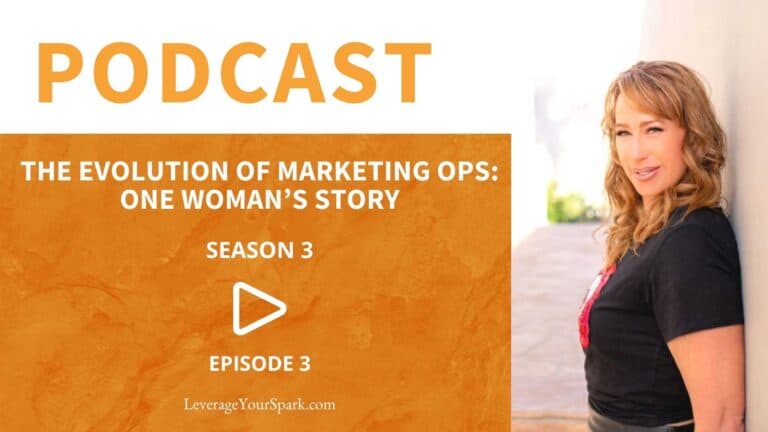The Evolution of Marketing Ops: One Woman’s Story

I’ve run my own business for 10 years, and in that time, we’ve always been a marketing operations company. I just didn’t realize it. Join me on a little journey through my experience in the evolution of marketing ops to give you some insights on how we got here and the insider scoop on how your organization can benefit from embracing it.
There’s no way any of us can really know what we want to be when we grow up, because the “career” we ultimately have likely consists of jobs that didn’t exist before. I feel this deeply when chatting with my son, who is a third grader, and even more deeply as I consider that I only realized in the last si months the kind of company we’ve been creating for ten years.
Listen to Season 3: Episode 3
The Evolution of Marketing Ops in My Life
Looking back, it is so very clear that I’ve pretty much always been in marketing operations (aka marketing ops). There just wasn’t a name for it. In fact, I like to joke that I was the weirdo marketing major taking a C++ programming class in 1997. Yes, my undergrad degree is in marketing, and my career has been in marketing. I’m an anomaly.
My interest in marketing and technology was further perpetuated by a job I got my sophomore year of college with a company called Extended Systems as a sales assist and first-tier tech support. The interview I had for the job was one of the most rigorous I’ve ever experienced. The technical portion of the interview had me pricing out a printer-sharing system after a brief explanation of how it worked. I must have done okay because I got hired.
I really started finding my stride after being hired by that same company into a full-time role as a marketing assistant doing direct mail, trade shows, managing marketing budgets, and project managing campaigns. In addition to those duties, I started helping with the website. It was 500 html pages in three languages. That meant that a change to the menu meant updating 500 files. But I loved it.
I was the beneficiary of an exceedingly generous IT guy who taught me how websites work and helped me learn to code website forms. Thanks, Rami!
The Relationship Between Marketing and IT
At that time, the marketing team and IT team had clear roles: the IT team managed our web server, gave us permissions, and basically provided the place for the website files. Because updating 500 html files wasn’t sustainable, marketing and IT together chose and implemented a content management system. That is when the roles started to get more blended.
Later, I went to work for a consumer electronics company that had a website team separate from the marketing team. With that structure, there was a lot of “drag” in getting updates made and things published. Digital was a growing need for other parts of marketing ops, and the ability to get things done was regularly impeded by competing priorities and lack of a cohesive marketing strategy and plan.
Bigger Doesn’t Always Mean Better
I thought the issues could be fixed by working for a bigger company. More resources must mean that we can get more done, right? My last corporate job was with a big company; a company that is known for selling domain names. There, I led a product team that worked with development teams, separate customer marketing teams, and separate business intelligence teams. Developers didn’t really get the context of marketing ops, and I had to lobby the business intelligence team to get information to evaluate our marketing efforts. It was almost impossible to get our projects to the head of the line with the front-of-site team. Nope, more resources didn’t fix it either.
Into My Own Business
FieryFX started as just me helping with and creating websites. In this role, I needed to be the marketing team and marketing ops for clients. It wasn’t enough to be able to implement; to truly achieve business objectives, clients needed assistance defining what to implement and why, then also have help with the how.
Over the last ten years, we’ve expanded to help with other aspects of marketing, and I’ve worked to try to clearly convey how we help. Even when I launched my podcast, I was still struggling to capture what we do, and that’s where the idea of the “simple machines of business” came up and the idea that there are specific areas that can more easily amplify effort.
Finally, I was able to connect that to an industry term: marketing operations/marketing ops. We are the team that can implement, fix, expand, and scale marketing success. The pit crew for your marketing race team.
Our passion for “smart business” is really an extension of marketing ops, adding effectiveness and efficiency to how marketing is implemented to get the best results and quickly iterate.
Now we have a term for our zone of genius, using our superpower to help marketing teams suffer less frustration and lag and improve their effectiveness, visibility to what works, and ability to scale. This is marketing ops.
How Can We Help with Your Marketing and Marketing Ops?
It sucks when projects or tasks get held up due to access issues, or the team just doesn’t know where to go to get something updated. Avoid this problem by getting all your website info in one place.
I’ve developed a Quick Reference Template that puts all the technical details for your website, from domain host to website platform access, in one place. Be sure to grab yours!
In the next episode, I’m getting a little ranty about a word, in my opinion, that’s been misused by the corporate establishment for too long. I’m starting the movement to kill the word “excellence.” Check back here next week to learn why.

